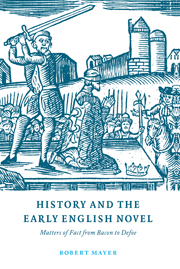Book contents
- Frontmatter
- Contents
- List of illustrations
- Acknowledgments
- Introduction
- 1 Baconian historiography: the contours of historical discourse in seventeenth-century England
- 2 “Idle Trash” or “Reliques of Somthing True”?: the fate of Brut and Arthur and the power of tradition
- 3 The History of Myddle: memory, history, and power
- 4 Lifewriting and historiography, fiction and fact: Baxter, Clarendon, and Hutchinson on the English Civil War
- 5 The secret history of the last Stuart kings
- 6 “Knowing strange things”: historical discourse in the century before Robinson Crusoe
- 7 “History” before Defoe: Nashe, Deloney, Behn, Manley
- 8 Defoe's historical practice: from “The Ages Humble Servant” to Major Alexander Ramkins
- 9 “Facts that are form'd to touch the mind”: Defoe's narratives as forms of historical discourse
- 10 From history to the novel: the reception of Defoe
- Conclusion
- Index
- CAMBRIDGE STUDIES IN EIGHTEENTH-CENTURY ENGLISH LITERATURE AND THOUGHT
3 - The History of Myddle: memory, history, and power
Published online by Cambridge University Press: 31 October 2009
- Frontmatter
- Contents
- List of illustrations
- Acknowledgments
- Introduction
- 1 Baconian historiography: the contours of historical discourse in seventeenth-century England
- 2 “Idle Trash” or “Reliques of Somthing True”?: the fate of Brut and Arthur and the power of tradition
- 3 The History of Myddle: memory, history, and power
- 4 Lifewriting and historiography, fiction and fact: Baxter, Clarendon, and Hutchinson on the English Civil War
- 5 The secret history of the last Stuart kings
- 6 “Knowing strange things”: historical discourse in the century before Robinson Crusoe
- 7 “History” before Defoe: Nashe, Deloney, Behn, Manley
- 8 Defoe's historical practice: from “The Ages Humble Servant” to Major Alexander Ramkins
- 9 “Facts that are form'd to touch the mind”: Defoe's narratives as forms of historical discourse
- 10 From history to the novel: the reception of Defoe
- Conclusion
- Index
- CAMBRIDGE STUDIES IN EIGHTEENTH-CENTURY ENGLISH LITERATURE AND THOUGHT
Summary
Fiction and fact were, under the proper circumstances, compatible elements in even the most progressive, rigorous forms of historical discourse in the seventeenth and early eighteenth centuries, but history nevertheless was preeminently the form of learning based upon matters of fact. Not all “facts,” however, were such as might be obtained from Camden's “Papers and Writings” or “Monuments and Records”; not all of a historian's particulars were the product of erudition and research. Writers of history also depended upon anecdotal information that came to them through their ordinary lived experience; Camden cited his extensive travel throughout England as a major source of material for Britannia. Both personal and communal experience and memory were important sources for early modern English writers of history, especially local and natural history. This feature of historical practice meant that there was ample room in the historical discourse of the period for marvelous events and scandalous reports; gossip, hearsay, and rumor were all incorporated in historical texts of the period. But it also meant that history-writing was often an embodiment of power relations and struggles, since, as Patricia Meyer Spacks has argued, gossip and other forms of “ ‘natural’ discourse” are means used by ordinary individuals to affect “the public sphere.”
These features of early modern English historiography are vividly revealed in Richard Gough's “Observations concerning the Seates in Myddle and the familyes to which they belong,” the second and longest part of a local history about the author's own parish, the Church of St. Peter in Myddle Parish, Shropshire.
- Type
- Chapter
- Information
- History and the Early English NovelMatters of Fact from Bacon to Defoe, pp. 54 - 74Publisher: Cambridge University PressPrint publication year: 1997

